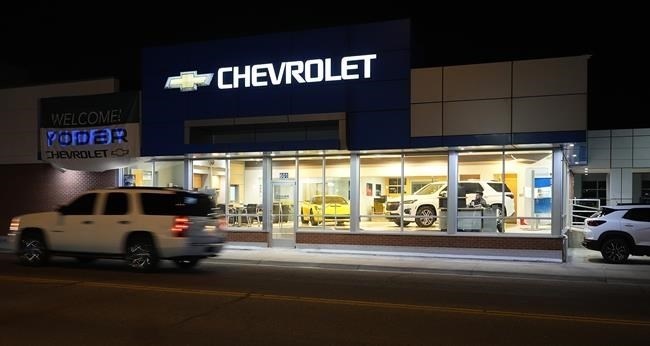
FILE- A a vehicle passes a Chevrolet dealership in Fort Lupton, Colo. Many car shoppers neglect a key factor that can help save money: getting the best value for their trade-in vehicle.
Image Credit: AP Photo/David Zalubowski
February 11, 2024 - 1:00 PM
Most car shoppers focus their time and energy on getting the best sale price during a vehicle purchase. This is understandable considering the purchase price is the biggest number in the transaction. But a lot of these shoppers fail to consider another key factor that can help save money: getting the best value for their trade-in vehicle.
Being prepared with your trade-in at a dealership can make a difference of thousands of dollars in the bottom line. Here are some tips from Edmunds to help you maximize your trade-in value and avoid common mistakes.
WHAT TO DO BEFORE YOU GET AN APPRAISAL
A used vehicle appraisal is how much a dealership is willing to pay for your vehicle. It’s based on the status of your vehicle as well as the appraiser’s opinion of it. You can’t do anything about the mileage on your vehicle, for example, but there are other factors you can influence to your advantage.
It’s better to handle vehicle transactions when you have time rather than when circumstances require it. Getting ready to trade in your vehicle before you absolutely must buy a new one will help you prevent costly mistakes and avoid situations where you have reduced negotiating power.
DECIDE WHAT TO DO ABOUT POSSIBLE REPAIRS
It’s possible that your trade-in vehicle will have some issues that you never got around to fixing. In general, it’s probably going to be more cost-effective and less of a hassle to not do the repairs and have the dealership deduct its repair costs from its appraisal offer. Dealers can often fix problems for significantly less than you can. So don’t feel obligated to make your car perfect.
There’s at least one advantage to fixing smaller problems yourself, however. Doing so allows you to control the cost of a repair or replacement rather than letting the dealership’s appraiser decide what the cost should be. And signs of neglect will no doubt weigh on the appraiser’s mind in making an offer. If a fix is easy for you, it may be worth doing.
Also, clean your car. The dealership will put any vehicle it resells through a thorough detailing before it goes on the lot, so you don’t need to spend extra for that. But vaccuming the Cheerios out of the crevices will save you both dollars and dignity when the appraiser makes the final decision.
If you’ve got aftermarket parts on your car, consider taking them off and installing the original parts. The value of the aftermarket parts sold separately is likely a lot higher than the dealership’s valuation, which might not be much at all.
BE READY TO NEGOTIATE
Remember that you surrender all your power in a negotiation unless you’re willing to walk away. So don’t rely on the dealer where you’d like to buy a new vehicle to give you the best offer. Be prepared for a low offer and know what you’ll say when it’s presented. This is where being prepared matters. Having a clean, well-maintained vehicle will put you in a defensible position with the appraiser. Be prepared to make a case for your car’s value by pointing out areas where the dealership won’t have to spend money — tires, for example.
Online valuation tools will give you further evidence of your car’s value, and most generate both a private-sale and trade-in value. Having these on hand can bolster your case for a higher price.
GET SEVERAL OFFERS
Even more powerful than a clean vehicle and valuation arguments is having another offer or two in your pocket. There are no shortage of ways to do this — including Edmunds or other sites where you can enter your car’s mileage, condition and VIN and generate an offer. Many of these offers are contingent on having them verified in person. Doing so takes time, but it also produces a leverage tool that a buying dealer can’t ignore
CONSIDER A PRIVATE SALE
You’ll put more in your pocket if you sell your car yourself, but doing so comes with distinct drawbacks in time and risk. If you decide on a private sale, familiarize yourself with your state’s laws. Many state departments of motor vehicles or Secretary of State websites provide templated bills of sale or other required paperwork. And be keenly aware of potential fraud. Doing the deal at your buyer’s bank may bring you comfort.
EDMUNDS SAYS
Remember that when you trade in a car you’re accepting a lower price in exchange for being relieved of the hassle of selling it yourself. Essentially, you’re paying the buying party for any reconditioning your car may need as well as for the paperwork and possibly the marketing of your vehicle. And that sale needs to be a price the dealer can profit from, so don’t expect a retail price for your trade-in.
____
This story was provided to The Associated Press by the automotive website Edmunds.
Josh Jacquot is a contributor at Edmunds.
News from © The Associated Press, 2024